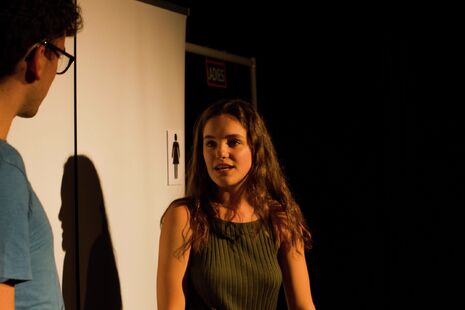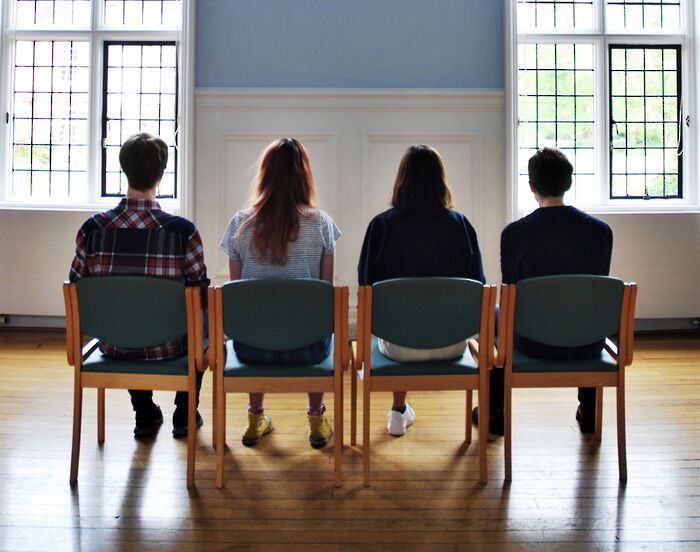The Ladies review
This prescient and poignant play is well written and acted, but occasionally overplays its naturalistic awkwardness

Set in the female toilets of a pub, The Ladies is a clever and insightful piece of new writing by Alice Tyrrell, particularly remarkable for its relevance and realism. It is brilliantly funny while also being incredibly poignant; it touches on many important topics surrounding sexuality and gender without ever making us feel like we are being lectured. Rather, we feel like we are watching genuine conversations between familiar characters – people that we can personally relate to, people that are our friends, people that we have met. There are no romanticisms, no liberties taken with the script that make it feel stilted or unrealistic. These are conversations we can imagine overhearing, or even partaking in, in real life.
Tyrrell’s writing perfectly matches the message they are trying to portray, namely that common perceptions of sexuality are often incorrect, based on in-built stereotypes that can be detrimental to our understanding of our own and others’ sexual orientations. This is done through a weaving pattern of exchanges between various characters, slowly building a narrative through different people’s perceptions of events. Most prominently, gender identity is explored through the inclusion of the non-binary character, Ash (Ell Aitken). Periods are discussed as a normal part of everyday life, bringing into stark awareness for me the fact that I don’t think I have ever seen periods talked about or even mentioned on stage before. Similarly, Tyrrell focuses on the wealth divide, something that is again not often publicly discussed but affects many, particularly in Cambridge, where wealth is often assumed. Hand in hand with this assumption Tyrrell presents and rejects the notion that all people will, or want to, go to university.
I cannot praise enough how naturalistically all of these topics were approached and how, within the play itself, they never felt out of place or forced into the conversation. They were all given their due place, but never lingered on unnecessarily. Instead they were presented humorously, intricately woven into the small-talk that was also brilliantly witty in its relatability. The fact that Tyrrell’s writing never feels forced or fake is possibly due to the characterisations of figures who feel incredibly real and, for want of a better word, “normal”. They are not portrayed as sexist or homophobic in any way, and yet the way they talk about Freya being gay or the way Harry reacts to Ash explaining their pronouns acutely demonstrates the lack of understanding that still pervades our society when it comes to gender and sexuality.
Tyrrell’s writing never feels forced or fake
The acting on the whole brings Tyrrell’s script to life with conviction. Kay Benson and Lydia Clay-White are especially commendable in their roles as Jess and Poppy respectively, bringing the brilliant humour that only two drunk girls in a pub can bring. Benson expertly embodies Jess, both vocally and physically, playing with her hair in the mirror and chipping in dryly to the conversation. In perfect opposition to this is Clay-White, gushing and chatty and full of energy. As a pair they are painfully familiar, as is the character of Millie, portrayed by Hannah Brown. Millie lives in the countryside near Plymouth and isn’t used to going out and getting drunk; she is very friendly, if a little socially awkward. Brown brings her to life exquisitely: bobbing on her toes, wide-eyed and eager to make friends, always keen to help out, but never really knowing what to say.
Millie’s boyfriend Joe (Arthur Roadnight) is equally well-portrayed. Joe is that friend from school who goes to university and becomes a party animal. Roadnight rushes onto the stage, hilariously awkward and energetic. His conversation with Harry (Freddie Bartlett-Evans) is wonderfully floundering, the two boys desperately searching for conversation while they wait for their girlfriends to come out of the toilet. Ella (Sophie Kean) and Freya (Fran Davis) have a similarly engaging dynamic, but with a much subtler tone. Furthermore, Davis’s acting when left alone with her thoughts is brilliantly restrained and Kean’s speech towards the end is both understated and moving, allowing the only bit of more poetic language in the play to be expressed without feeling over-dramatic.
The main criticism I have is that the awkwardness sometimes came across as genuine, rendering some moments slightly stilted. This was particularly true in the scenes between Harry and Ella, making their relationship a little unbelievable. The opening scenes could have done with more chemistry from the main characters in order to draw us into the story and, subsequently, make us care more about the developments throughout the rest of the play. Furthermore, the final build to the crux of the narrative felt a bit rushed, as most of the show had been skirting around the issue at hand. A more gradual build of emotion might suit the naturalistic style better.
Overall, The Ladies is poignant, important and relatable. It is wonderfully written and addresses so many relevant issues – ones that need to be brought to the forefront of theatrical discussion, and Tyrrell is exactly the person to do this. With further work on intimacy and performance, this show could reach its full potential.
 Comment / Plastic pubs: the problem with Cambridge alehouses 5 January 2026
Comment / Plastic pubs: the problem with Cambridge alehouses 5 January 2026 News / Cambridge businesses concerned infrastructure delays will hurt growth5 January 2026
News / Cambridge businesses concerned infrastructure delays will hurt growth5 January 2026 News / New movement ‘Cambridge is Chopped’ launched to fight against hate crime7 January 2026
News / New movement ‘Cambridge is Chopped’ launched to fight against hate crime7 January 2026 News / Uni-linked firms rank among Cambridgeshire’s largest7 January 2026
News / Uni-linked firms rank among Cambridgeshire’s largest7 January 2026 News / AstraZeneca sues for £32 million over faulty construction at Cambridge Campus31 December 2025
News / AstraZeneca sues for £32 million over faulty construction at Cambridge Campus31 December 2025









